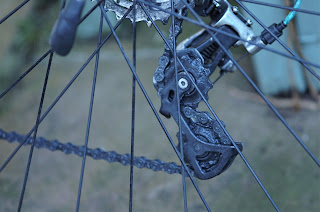November has crept in stealthily. Temperatures struggle to reach double figures, skies are sombre, and the roads are strewn in a mucky slurry. The sort that sticks to frames and tyres, encouraging flints and other sharps to burrow inside, inducing flats. I’ve had three in as many rides.
Two post ride-one apiece up front in the 28mm CST Czar and Vittoria Roubino Pro Control Graphene 2.0 Vittoria Rubino Pro Control Graphene 2.0 | cycling-not-racing (sevendaycyclist.com) and most recently, the rear Vittoria on the return leg, 2 miles from home at 5.30 am. Presented the opportunity to see how conducive the Shimano RX6 shoes were to running in- well, as it happens.
While running alongside my fixed gear trainer, I pondered the solution and concluded I’d go for the Kenda Kwick Journey KS Plus KENDA KWICK JOURNEY TYRES | cycling-not-racing (sevendaycyclist.com) on both rear halo hoops (since the frame’s rear triangle will only accept 32mm and mudguards. OK, 35mm at a pinch.) and the Vittoria Adventure Tech Tyres. These carry a joint weight penalty close to a kilo.
However, both roll remarkably well and have excellent puncture resistance, albeit their puncture-repelling belts (5mm and 3mm respectively) only cover the centre strips. Obviously, tyres need to roll and handle in decent proportion, but reliability is imperative. There's nothing more morale-sapping than a series of flats in freezing rain, miles from home.
Or, for that matter, a long walk home. I carry at least two new tubes and a patched spare. CO2 inflator and cartridges save time, although a decent pump should never be overlooked. I also like to keep these close to hand, and easily accessible. Small bar bags, tool bottles can be more convenient than the wedge pack (although I tend to distribute kit evenly across the three).
Oxford Products have sent us their Evo Aqua Adventure range of luggage. Following the access narrative, I’ve gone for their top tube bag. It’s made from 400 denier Rip stop TPU, features welded seams and is weather resistant to IPX6.
1.5 litre carrying capacity, which is generous. “Bolt on” packs like the Apidura that tether to a frame’s bosses (or via these Tektro Versa mounts) are the most secure, overcoming any risk of movement, especially when filled close to capacity. Some pedalling styles can also result in occasional knee contact, which is another consideration when choosing one. On the stability front, some Velcro models favour larger diameter/ flatter profiled top tubes. Only time and miles will tell but giving change from £20, the EVO Acqua looks a good deal.
Thankfully, temperatures have held around 2-3 degrees overnight, so I haven’t shod Ursula with spikes just yet. I have mounted one to the Alfine dyno hub Shimano Alfine UR700 Hub Dynamo | cycling-not-racing (sevendaycyclist.com) wheel in anticipation- makes switches faster later down the line.
I also took the opportunity to strip the old girl’s Deore Crankset and trailer wheel, replacing the Peaty’s Speed Grease PEATY'S SPEED GREASE | cycling-not-racing (sevendaycyclist.com) with some Juice Lubes Bearing Juice. A synthetic grease blended specifically for, er bearings.
It’s thick and tacky, so great for packing hubs, headsets, bottom brackets and pedals. It’s also apparently tested to marine standards (meaning excellent adhesion and sealing properties) and suitable for contact points.
However, something like Park Poly lube PPL1000 TESTED: PARK TOOL POLYLUBE 1000 LUBRICANT FOR BICYCLES (sevendaycyclist.com) or Peaty’s Bicycle Assembly Grease PEATY'S BICYCLE ASSEMBLY GREASE | cycling-not-racing (sevendaycyclist.com) is a better bet for threaded components. There was a surprising amount of Speed Grease clinging to the Deore axle, and a liberal helping of degreaser was needed to strip it convincingly, too.
Continuing my prevention better than cure narrative, I wanted to get these jobs done before winter got one step ahead. Right, while I contemplate a chain replacement, I’ll leave you with my review of the Infini Tron Infini Tron Rear Light | cycling-not-racing (sevendaycyclist.com)
















